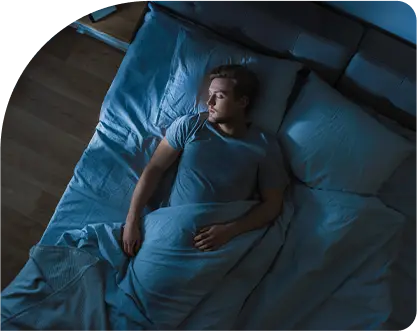How to Fall Asleep Fast
Published: 2024-04-10
 Updated: 2025-02-04
Updated: 2025-02-04
4 mins
In today’s fast-paced world it can be difficult to reach that state of relaxation that lets you shut down and rejuvenate over a night’s rest.
Whether it's stress, distractions, or simply an overactive mind, many of us struggle to fall asleep quickly and effectively.
But if you have the right techniques, you can fall asleep in a matter of minutes (or seconds!) and wake up refreshed and ready to take on the day.
In this article, we'll explore proven strategies and techniques to help you drift off to sleep effortlessly, ensuring you wake up feeling refreshed and ready to tackle the day ahead.
From establishing a soothing bedtime routine to incorporating relaxation techniques, we'll uncover the secrets to achieving quality sleep in no time.
Tired of insomnia?
Explore prescription medications tailored to help you get better sleep.
Get Started
Why Am I Struggling to Fall Asleep?
Struggling to fall asleep can be due to various factors. Stress and anxiety often play a significant role, as they can lead to racing thoughts and an inability to relax.
Poor sleep hygiene, including irregular sleep schedules, excessive screen time before bed, and consuming stimulants like caffeine close to bedtime, can also disrupt your ability to fall asleep. Additionally, environmental factors such as a noisy or uncomfortable sleep environment, excessive light, or uncomfortable bedding can contribute to sleep difficulties.
Underlying health conditions such as insomnia, sleep apnea, restless leg syndrome, or mental health disorders may also be contributing factors.
If you continue to struggle with falling asleep despite trying to address these factors, it may be helpful to consult with a healthcare professional for further evaluation and guidance.
Techniques for Falling Asleep
Establish a bedtime routine
Establishing a bedtime routine is a powerful way to signal to your body that it's time to wind down and prepare for sleep.
Create a calming routine before bed that can put you in a state of relaxation before getting into bed. This might include activities like reading a book, taking a warm bath, or practicing relaxation exercises.
Create a comfortable sleep environment
Make sure your bedroom is conducive to sleep by keeping it dark, quiet, and cool. Consider using blackout curtains, earplugs, or a white noise machine to block out any disruptive noises
Invest in a comfortable mattress and pillows to ensure optimal comfort.
Oil diffusers or candles with calming scents like lavender or eucalyptus may help soothe you and help you transition from wakefulness to sleepiness.
Listen to nature sounds, or calming music to block out background noise and promote relaxation.
Consider natural supplements or teas
Certain herbal supplements like valerian root or chamomile tea may have mild sedative effects that can help promote relaxation and sleepiness.
Magnesium is an essential mineral that plays a role in regulating neurotransmitters involved in sleep. Supplementing with magnesium may help improve sleep quality, especially for those with magnesium deficiency.
Lemon balm is a member of the mint family known for its calming effects. Drinking lemon balm tea before bed may help reduce anxiety and promote relaxation, leading to better sleep.
Limit exposure to screens
The blue light emitted by screens can interfere with your body's production of melatonin – a hormone that regulates sleep.
Try to avoid screens (phones, computers, TVs) for at least an hour before bed.
Manage stress
Stress and anxiety can make it difficult to fall asleep. Practice stress-reducing techniques such as deep breathing, meditation, or progressive muscle relaxation to help calm your mind before bed.
Progressive muscle relaxation, visualization, or mindfulness meditation can help relax your body and mind, making it easier to fall asleep. Some of these relaxation techniques include counting sheep, box breathing, and guided imagery.
Watch your diet and caffeine intake
Avoid heavy meals, caffeine, and alcohol close to bedtime, as they can disrupt your sleep cycle.
Exercise regularly
Regular physical activity can help improve sleep quality. However, try to avoid vigorous exercise close to bedtime, as it may energize you and make it harder to fall asleep.
Limit naps
While short naps can be beneficial, long or late naps can interfere with your ability to fall asleep at night. Try to limit naps to 20-30 minutes earlier in the day if needed.
Consider sleep medications
If other methods prove ineffective and you're still experiencing sleep difficulties, considering sleep medication may be an option.
Ramelteon – a non-addictive sedative – operates by influencing specific areas of your body and brain responsible for regulating the sleep-wake cycle. Unlike conventional sleep medications, Ramelteon isn't classified as a controlled substance.
Additionally, it can be taken on an as-needed basis, providing convenience for those nights when falling asleep is a challenge. Within approximately 30 minutes of taking Ramelteon, you'll find yourself drifting off to sleep, and the following morning, you'll awaken feeling refreshed and rejuvenated.
How Can Rex MD Help?
Remember that everyone's sleep needs and preferences are different, so it may take some experimentation to find what works best for you. If you continue to struggle with falling asleep despite trying these techniques, consider consulting a healthcare professional for further evaluation and advice.
If you're having a hard time getting quality sleep and are looking to improve, Rex MD’s sleep medications may help too. Get started today.









 Medically reviewed by Anthony Puopolo, MD
•
Medically reviewed by Anthony Puopolo, MD
•





